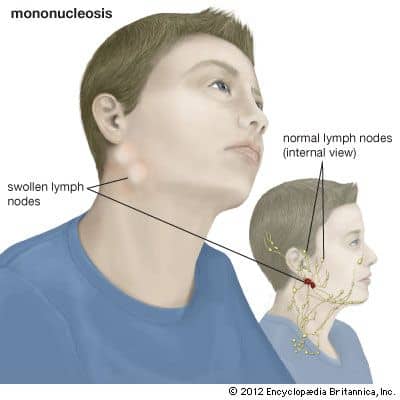Unraveling the Mystery: Glandular Fever Causes Explained for Parents
Hello fabulous parents! It’s time to talk about something you’ve probably heard of but might need a little more info on – glandular fever. Now, don’t fret! We’re here to guide you through what causes this illness so you can be on top of your parenting game! ?
Glandular fever, also known as infectious mononucleosis or “mono”, is a contagious disease mostly affecting teenagers and young adults. While it can be uncomfortable and sometimes concerning for both the child and the parent, understanding its causes is the first step towards ensuring your child’s speedy recovery and comfort. So, let’s dive in!
What Exactly Causes Glandular Fever?
The most common culprit behind glandular fever is the Epstein-Barr virus (EBV), a member of the herpes virus family. It’s incredibly widespread – so common that most people will be infected with it at some point in their lives. However, not everyone will develop glandular fever from the virus, and the reasons why are still a little bit of a puzzle to scientists. ?
How Does the Epstein-Barr Virus Spread?
EBV spreads primarily through bodily fluids, most often saliva – yes, the reason why it’s sometimes called “the kissing disease.” But let’s clear up a myth – it’s not only through kissing! Sharing drinks, food, or even being near someone who is coughing or sneezing can spread the virus. It’s crucial for parents to encourage good hygiene habits in their children, like not sharing drinking bottles or utensils with friends.
Other Contributing Factors
There are other factors that can contribute to the development of glandular fever in children and young adults:
- Age: Most cases of glandular fever occur in young adults aged between 15 and 24 years.
- Immune System: Individuals with weakened immune systems, may be more susceptible to developing symptoms after infection with EBV.
- Genetics: Some evidence suggests a genetic predisposition to developing glandular fever.
Spotting the Signs Early
As parents, you’re probably wondering how to identify glandular fever. Symptoms can take 4 to 6 weeks to show after exposure to the virus and can include:
- Fever
- Sore throat
- Swollen lymph nodes, especially in the neck
- Fatigue
- Swollen spleen or liver
Noticing these signs and consulting a medical professional can lead to an accurate diagnosis and appropriate care.
Is Glandular Fever Serious?
Most of the time, glandular fever is self-limited, and while the symptoms can be quite debilitating for a while, they usually resolve without any serious complications. However, in rare cases, complications such as an enlarged spleen, liver issues, or anemia can occur.
Wow, we’ve covered a lot here, haven’t we? From the spread of EBV to spotting the signs of glandular fever, ensuring you’re loaded with information to help your child navigate through this illness. Hang tight for the continuation of this guide, where we’ll explore how to care for your child with glandular fever, ways to make them comfortable, and tips on prevention.
Remember, knowledge is power, and as always, your child’s wellbeing is our top priority. Till then, keep those hygiene habits top-notch and spread love and care, not germs! ?

The Comprehensive Guide for Parents: Preparing for Glandular Fever
As loving parents on the constant lookout for your children’s well-being, it’s important to equip yourselves with the essential knowledge about diseases that might affect your little ones. Today, we’re shining a light on glandular fever – a common illness that could impact your child’s health. Let’s walk through five must-know tidbits to help you prepare effectively for glandular fever causes and keep your family happy and healthy!
Understanding the Epstein-Barr Virus (EBV)
First off, knowing the primary cause of glandular fever is key – and that’s the Epstein-Barr virus. EBV is one of the most common viruses around, and while it might sound super scientific, the lowdown is that it’s spread through close contacts such as kissing (hence the nickname ‘kissing disease’) or sharing drinks and utensils. Awareness leads to prevention, so inform your kids about the importance of not sharing personal items, even with their best buddies!
Recognizing Symptoms: Early Action Matters
Awareness of glandular fever symptoms can truly be a game-changer. Typical signs such as fever, sore throat, swollen glands, and fatigue may develop about a month after exposure to EBV. Knowing these could prompt you to seek medical advice sooner rather than later, ensuring your precious ones get the care they need swiftly.
Immunity and Glandular Fever
Second, understanding that some kids might be more prone to developing symptoms of glandular fever due to lower immunity is crucial. Whether it’s due to an existing condition or simply their body’s unique response to viruses, strengthening their immune system with healthy foods, adequate sleep, and regular exercise can make a world of difference.
Age Matters in Glandular Fever
Though EBV can infect anyone, glandular fever predominantly targets teenagers and young adults between the ages of 15 and 24. So, when your child hits those teenage years, a little extra vigilance can go a long way. Keep an eye out for any unusual fatigue or persistent cold symptoms, as these can sometimes be glandular fever in disguise.
Genetics Might Play a Role
Did you know that the tendency to develop glandular fever might be written in your child’s genetic stars? Some research suggests that certain genetic makeups can make a person more susceptible to the effects of EBV. While this isn’t something you can change, it’s good to be aware of so you can monitor your child’s health with this in mind.
Complications Are Rare, but Vigilance is Key
Last but certainly not least, while glandular fever is generally not serious, in some rare instances, complications can occur. Keeping your healthcare provider in the loop about your child’s health status during their bout with glandular fever can help nip any potential issues in the bud before they bloom into real concerns.
There you have it, amazing parents – five crucial things to keep at the forefront of your mind when it comes to glandular fever. With this knowledge, you’re now better prepared to support and protect your children from this common yet often misunderstood illness.
Armed with your love and newfound insights, you can create a secure and caring environment for your children to thrive in, both in sickness and in health. Remember, when in doubt, always reach out to your child’s doctor for advice. They’re there to help you through the ups and downs of parenting. Let’s keep those little ones smiling and healthy!
See more great Things to Do with Kids in New Zealand here. For more information see here
Disclaimer
The articles available via our website provide general information only and we strongly urge readers to exercise caution and conduct their own thorough research and fact-checking. The information presented should not be taken as absolute truth, and, to the maximum extent permitted by law, we will not be held liable for any inaccuracies or errors in the content. It is essential for individuals to independently verify and validate the information before making any decisions or taking any actions based on the articles.




